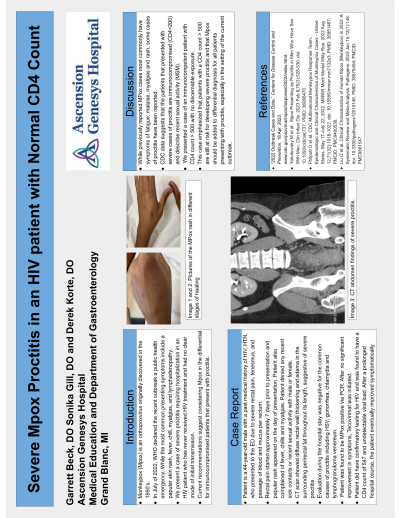Sunday Poster Session
Category: Colon
P0274 - Severe Mpox Proctitis in an HIV Patient with Normal CD4 Count
Sunday, October 22, 2023
3:30 PM - 7:00 PM PT
Location: Exhibit Hall

Has Audio
- GB
Garrett L. Beck, DO
Ascension Genesys Hospital
Burton, MI
Presenting Author(s)
Garrett L. Beck, DO1, Sonika K. Gill, DO2, Derek Korte, DO3
1Ascension Genesys Hospital, Burton, MI; 2Ascension Genesys Hospital, Grand Blanc, MI; 3Ascension Genesys, Grand Blanc, MI
Introduction: Monkeypox (Mpox) is an orthopoxvirus originally discovered in the 1950’s. In July of 2022, WHO declared the recent outbreak a public health emergency. While the most common presenting symptoms include a papular skin rash, fever, chill, myalgias, and lymphadenopathy. We present a case of severe proctitis requiring hospitalization in an HIV patient who has never received HIV treatment and had no clear mode of initial transmission. Current recommendations suggest considering Mpox in the differential for immunocompromised patients that present with proctitis.
Case Description/Methods: Patient is a 44-year-old male with a past medical history of HIV, HTN, who presented to the ED due to severe rectal pain, tenesmus, and passage of blood and mucus per rectum. Rectal pain started approximately 7 days prior to presentation and papular rash appeared on the day of presentation. Patient also complained of fever, chills and myalgias. Patient denied any recent sick contacts or recent sexual activity with male or female. CT scan showed diffuse rectal wall thickening and edema in the surrounding perirectal fat throughout its length, suggestive of severe proctitis. Evaluation during the hospital stay was negative for the common causes of proctitis including HSV, gonorrhea, chlamydia and lymphogranuloma venereum. Patient was found to be MPox positive via PCR. After no significant improvement in symptoms, Tecovirimat was initiated. Patient did have confirmatory testing for HIV and was found to have a CD4 count of 547 and undetectable viral load. After a prolonged hospital course, the patient eventually improved symptomatically.
Discussion: While previously reported MPox cases most commonly have symptoms of fatigue, malaise, myalgias and rash, some cases of proctitis have been reported. CDC data suggests that the patients that presented with severe cases of proctitis are immunocompromised (CD4< 200) and describe recent sexual activity (MSM). We presented a case of an immunocompetent patient with CD4 count > 500 with no discernable exposure. This case emphasized that patients with a CD4 count > 500 are still at risk for developing severe proctitis and that Mpox should be added to differential diagnosis for all patients presenting with proctitis, especially in the setting of the current outbreak.

Disclosures:
Garrett L. Beck, DO1, Sonika K. Gill, DO2, Derek Korte, DO3. P0274 - Severe Mpox Proctitis in an HIV Patient with Normal CD4 Count, ACG 2023 Annual Scientific Meeting Abstracts. Vancouver, BC, Canada: American College of Gastroenterology.
1Ascension Genesys Hospital, Burton, MI; 2Ascension Genesys Hospital, Grand Blanc, MI; 3Ascension Genesys, Grand Blanc, MI
Introduction: Monkeypox (Mpox) is an orthopoxvirus originally discovered in the 1950’s. In July of 2022, WHO declared the recent outbreak a public health emergency. While the most common presenting symptoms include a papular skin rash, fever, chill, myalgias, and lymphadenopathy. We present a case of severe proctitis requiring hospitalization in an HIV patient who has never received HIV treatment and had no clear mode of initial transmission. Current recommendations suggest considering Mpox in the differential for immunocompromised patients that present with proctitis.
Case Description/Methods: Patient is a 44-year-old male with a past medical history of HIV, HTN, who presented to the ED due to severe rectal pain, tenesmus, and passage of blood and mucus per rectum. Rectal pain started approximately 7 days prior to presentation and papular rash appeared on the day of presentation. Patient also complained of fever, chills and myalgias. Patient denied any recent sick contacts or recent sexual activity with male or female. CT scan showed diffuse rectal wall thickening and edema in the surrounding perirectal fat throughout its length, suggestive of severe proctitis. Evaluation during the hospital stay was negative for the common causes of proctitis including HSV, gonorrhea, chlamydia and lymphogranuloma venereum. Patient was found to be MPox positive via PCR. After no significant improvement in symptoms, Tecovirimat was initiated. Patient did have confirmatory testing for HIV and was found to have a CD4 count of 547 and undetectable viral load. After a prolonged hospital course, the patient eventually improved symptomatically.
Discussion: While previously reported MPox cases most commonly have symptoms of fatigue, malaise, myalgias and rash, some cases of proctitis have been reported. CDC data suggests that the patients that presented with severe cases of proctitis are immunocompromised (CD4< 200) and describe recent sexual activity (MSM). We presented a case of an immunocompetent patient with CD4 count > 500 with no discernable exposure. This case emphasized that patients with a CD4 count > 500 are still at risk for developing severe proctitis and that Mpox should be added to differential diagnosis for all patients presenting with proctitis, especially in the setting of the current outbreak.

Figure: Image 1 and 2 show different stages of the rash and Image 3 shows severe proctitis on the CT
Disclosures:
Garrett Beck indicated no relevant financial relationships.
Sonika Gill indicated no relevant financial relationships.
Derek Korte indicated no relevant financial relationships.
Garrett L. Beck, DO1, Sonika K. Gill, DO2, Derek Korte, DO3. P0274 - Severe Mpox Proctitis in an HIV Patient with Normal CD4 Count, ACG 2023 Annual Scientific Meeting Abstracts. Vancouver, BC, Canada: American College of Gastroenterology.

